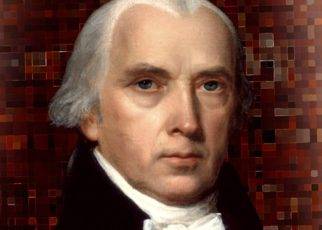James Madison (President from 1809-1816), standing only 5′ 4″ tall, was the smallest President in American history, yet his capable handling of the Presidency during the war of 1812 showed that his size was no measure of his abilities.
Madison the Federalist
Prior to becoming President, Madison had spent much more time as a political ally to the Federalist party.
As one of the chief authors of the new U.S. Constitution, and along with Alexander Hamilton the co-author of The Federalist Papers which helped persuade the ratification of the Constitution among the states, Madison was a chief proponent of the Federal form of government which stressed a superior federal government and somewhat limited state sovereignty.
Under Presidents Washington and Adams, Madison served as a Virginia representative to the United States Congress, wherein he earned even more fame by authoring the first ten amendments to the constitution, the Bill of Rights (even though he himself initially opposed the idea, believing that such rights were implicit in the constitution).
One might point to Madison’s opposition to Hamilton (one of the principle leaders of the Federalists, and Secretary of the Treasury under Washington) regarding the establishment of a national bank as the first step toward a break from Federalism.
After the defeat of John Adams to Jefferson in 1800, however, the party itself was in steady decline, and more and more the Jeffersonians (Democratic-Republicans) were becoming the sole viable political party.
Madison and Jefferson
By the time Jefferson left office, Madison was seen as carrying the torch of the previous President and his enlightened Democratic-Republican ideals. Madison had been Jefferson’s secretary of state during a very tense period of world affairs, when England and France were continually on the brink of war with each other (and occasionally over the brink).
Reactions to Madison’s years of secretary of state have been mixed throughout history. While he certainly earned points by serving as a driving force behind the Louisiana Purchase and helping to further define the borders of the United States, he also helped to engineer the Embargo Act of 1807, which hurt American agriculture more than it hurt the British (its intended effect).
Still, Madison was popular enough to be elected as Jefferson’s replacement in the election of 1808 with a total of 122 electoral votes (to his opponent, Charles Cotesworth Pinckney’s 47).
The War of 1812 and the Bank
Surely the most important event in the Presidency of James Madison was the war of 1812, which saw America fighting the British on U.S. soil once more.
Just after he had convinced Congress to declare war, Madison was elected for a second term over New York Governor DeWitt Clinton.
Toward the end of the war (which lasted about a year and a half), the British made their way to Washington D.C., forcing Madison to flee as the British proceeded to set the White House on fire.
Finally, with the Treaty of Ghent in December of 1814, the war ended, but Madison found the country facing a financial crisis as a result.
The charter for Hamilton’s First Bank of the United States had ended in 1811, and Madison had happily allowed this, blocking a further attempt to establish a replacement bank in 1814 by his Treasury Secretary, Alexander Dallas. In 1815, however, Madison finally realized that a national bank would be necessary to help the nation get back on its feet in a financial sense.
Madison’s Politics
After his second term expired, Madison retired to his estate in Virginia, working with his friend Thomas Jefferson to establish the University of Virginia and pursuing other matters.
What can be said, in the end, of Madison’s political affiliations? Though as President he was aligned with the views of Jefferson and the Democratic-Republicans, he clearly also held many lines of thought which were in direct correlation with the opposing Federalists (and even in a case where he disagreed with them, he relented in the end to accept their ideas).
One can make up their own mind about how where, exactly, Madison’s personal ideology truly lay. In the very least, it can be said that he had a unique ability to look at every issue critically and make up his own mind.





